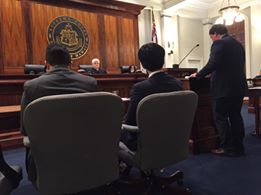Inter-Generational Climate Justice
The Global Center for Environmental Legal Studies (GCELS) is supporting the decision of the International Union for the Conservation of Nature’s (IUCN’s) 2016 World Conservation Congress (Congress) in Honolulu, Hawaii, inviting the General Assembly of the United Nations (UNGA) to request an advisory opinion from the International Court of Justice (ICJ) on the principle of sustainable development in view of the needs of future generations.
In advance of 2016 Congress, GCELS submitted Motion 087 on this question due to the concern that:
“Considering that sustainable development is generally defined as development that balances social, economic and environmental interests in order to meet the needs of the present generations without compromising the ability of future generations to meet their own needs, … [but] unless halted, environmental degradation worldwide as reflected in the climate crisis and the calamity of extinctions, will deny the option of sustainable development to future generations.”
Following an electronic vote, the Congress approved and adopted the Motion during the 1st Sitting of the Members’ Assembly, requesting the IUCN Director General to communicate this request to the UNGA with the assistance of the IUCN World Commission on Environmental Law.
 Through a joint initiative, the Environmental Law Programs with Pace Law and the William S. Richardson School of Law at the University of Hawaii hosted the “Tony Oposa Intergenerational Moot Court” named after the internationally renowned environmental attorney from the Philippines and former visiting scholar at Pace Law. The Moot Court analyzed and presented arguments on the question of the intergenerational climate justice through written Memorials and oral arguments held before a mock panel of the ICJ with judges from France, Norway, Philippines, Russia, and USA, presided over by the Chief Justice of the State of Hawaii Hon. Mark E. Recktenwald, at the Supreme Court of the State of Hawaii.
Through a joint initiative, the Environmental Law Programs with Pace Law and the William S. Richardson School of Law at the University of Hawaii hosted the “Tony Oposa Intergenerational Moot Court” named after the internationally renowned environmental attorney from the Philippines and former visiting scholar at Pace Law. The Moot Court analyzed and presented arguments on the question of the intergenerational climate justice through written Memorials and oral arguments held before a mock panel of the ICJ with judges from France, Norway, Philippines, Russia, and USA, presided over by the Chief Justice of the State of Hawaii Hon. Mark E. Recktenwald, at the Supreme Court of the State of Hawaii.
In a follow-up workshop at the 2016 World Conservation Congress, international environmental law judges and experts, as well as the moot court participants, further discussed the issue.
Students and faculty members are following up on this proposal with the IUCN Permanent Observer Mission to the UN.
